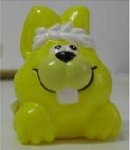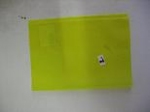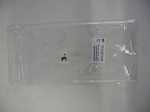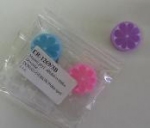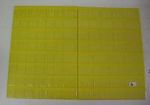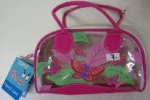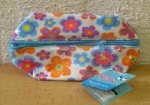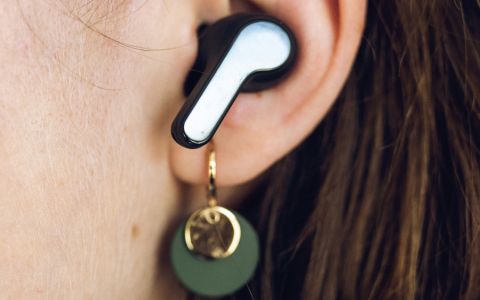High concentrations of phthalates (1) were found in some teaching aids sold on Czech market. „It confirmed our concerns as increased levels of phthalates were registered in all eight tested products,“ (2) head of the campaign „Don't Play with PVC“ Miroslava Jopková commented on results of analyses made on Arnika's request by the Institute for Testing and Certification (ITC) in Zlín which confirmed by chemical analyses risky content of randomly selected basic teaching aids made of PVC.
Arnika exhorts all parents not to buy teaching aids and other products made of PVC. „It is better to avoid this material which contains softeners as consumers by themselves cannot recognize whether products contain hazardous phthalates or not. There are enough alternatives in case of the teaching aids. Packages can be made of polyethylen, there are metal pencil sharpeners and pencases can be from textile“ Jopková said.
The tests(3)discovered increased content of phthalates in all analyzed products. The worst results concerned PVC eraser in a shape of cut lemon, imported by Donau-Design Ltd. from China – it contained more than 37 % risky phthalate DEHP per product weight. Di-(2 ethylhexyl) phthalate (DEHP) prevailed in the tested products – in a range between 8, 97 % and 37,14 % of product weight. DEHP is highly risky because it has toxic effect mainly on the reproductive system, harms the cardiovascular system, has a negative impact on thyroid gland functioning and accumulates in the liver and kidneys.
PVC pencil sharpener in the form of bunny was the only one containing different kind of phthalate - di-(isononyl)-phthalate (DINP), found in 18 % of its weight. „Impact of his kind of phthalate on human health has not been so far properly examined but animal tests proved it has toxic effects on the liver and kidneys, and carcinogenic effects were observed in rodents,“ Jopková explained.
Arnika's intention was to draw attention repeatedly by the results of testing on risks connected with the use of PVC. „We tested eight randomly selected teaching aids from PVC and phthalates were discovered in all of them so that it is very probable that other teaching aids made of PVC may contain these chemicals too,“ Jopková continued. Six most risky phthalates (including DEHP and DINP) had been limited in terms of production of toys and other children products because of their negative health effects.
According to the Czech Trade Inspection (ČIŽP), such limitation should concern also other teaching aids that can be used as toys. „In case the teaching aid resembles a toy and is thus supposed to be used by the most little children, such as in the case of „bunny“ pencil sharpener or lemon-like eraser, in such cases producers should take into account fact that these aids attract children as toys. When they use them they are exposed to the same health risks because of which certain phthalates are legally banned to be used in toys and children's products,“ explained spokesman of the Czech Trade Inspection, Marek Ženkl. „We are going to examine particular products on the basis of today's Arnika's suggestion,“ he added.
Requirement not to use PVC as a materials for production of toys and children products is one of points of the petition „For PVC Substitution“ which had been so far supported by almost 10 000 people including famous scientists, politicians and cultural personalities (4)
Appendices:
1) Phthataltes or phthalic acid esters represent group of about 40 chemicals. They are used as softeners of PVC but are also utilized in cosmetics or as insecticides or adhesives. The use of the most hazardous phthalates was limited due to their negative health consequences for example in case of toys and children products and in cosmetics. The limitation concerns following six phthalates:
di-isononyl phthalate (DINP), di-n-octyl phthalate (DNOP), di-iso-decyl phthalate (DIDP), butyl benzyl phthalate(BBP), dibutyl phthalate (DBP),di(2-ethylhexyl) phthalate(DEHP).
2) Review of the analyzed products:
3) Results review:
| Product, analyzed part | Content of extractable substances (softeners) (weight %) |
Content of risky phthalates (weight %) |
| No. 1 Pencil sharpener „bunny“ | 37, 94 | 17,62 % DINP |
| No. 2 Wrapping for „pupil's index“ | 21,85 | 16,34 % DEHP |
| No. 3 Casing for wood crayons | 29,46 | 17,32 % DEHP; 1,34 % DINP |
| No. 4 lemon-like eraser | 50,12 | 37,14 % DEHP |
| No. 5 Top foil from alphabet folder | 20,12 | 12,39 % DEHP |
| No.6 Inner foil from alphabet folder | 21,22 | 11,41 % DEHP |
| No. 7 Pencase „handbag“ (transparent) | 24,56 | 12,08 % DEHP, 1,96 % DINP |
| No. 8 Pencase with flowers | 17,68 | 10,87 % DEHP |
| No. 9 Pencase - transparent | 23,12 | 8,97 % DEHP; 3,3 % DINP |
4) Altogether 9,978 people signed the petition „For PVC Substitution“ as of 12 August. There were also famous scientists, politicians and actors among the signatories - nephrologist Doc. MUDr. Kamil Ševela Csc., university professor Doc. Ing. Alžběta Jarošová, former consultant of minister of environment Ing. Dalibor Stráský, actor David Matásek, singer of band -123 minut Zdeněk Bína , musician Miky Ryvola and others.
Head of the campaign: This email address is being protected from spambots. You need JavaScript enabled to view it.
Head of the program Toxics and Waste: This email address is being protected from spambots. You need JavaScript enabled to view it.



